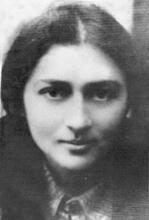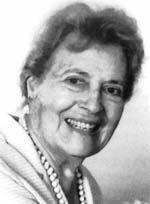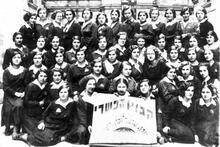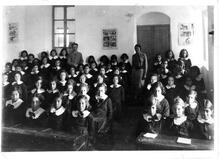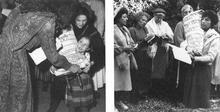Mina Fridman Ruetter
Mina Fridman, daughter of Ukrainian Jewish immigrants, was born in the city of Rosario, Argentina. She and her husband Santiago Ruetter were communist militants in the party's Yiddish-speaking section and worked tirelessly in organizations linked to anti-fascism during the years of the Spanish Civil War and World War II in the Argentine provinces of Santa Fe and Córdoba. In the mid-1970s, they settled in Buenos Aires, and Mina distinguished herself as an intellectual, a translator of Soviet books, and a leader of the Yiddisher Kultur Farband (YCUF). She devoted her time to giving lectures, teaching language classes, and translating the works of Pinie Katz from Yiddish to Spanish. Her self-taught training in Marxist theory and policy matters was reflected in numerous publications of the YCUF milieu.
Early Life & Family
Mina Fridman Ruetter was born on July 23, 1922, in the city of Rosario, province of Santa Fe, Argentina. Her parents, Abraham Fridman and Manie Nirenberg, were Ukrainian immigrants who met on the ship and arrived in Argentina on January 1, 1914. Upon arrival, they married and moved to Santa Fe, where their four children were born: Mina, Jaime, Berta, and Gregorio. In 1926, when Mina was four years old, her mother, only 35 years old, died. The children were left in the care of their aunts, but Mina had a special affection for her grandmother, who only spoke Yiddish and, although she was blind, lived until the age of 104. When Mina was 7 years old, her father married Malke Kaplan, an educated and generous woman who acted as a true mother.
Mina studied in public schools in the morning and in the afternoon she acquired progressive Jewish culture and improved her Yiddish (some of which she had learned at home) in the shule of Asociación Israelita de Rosario (Jewish Association of Rosario). There, her teacher and mentor, the lerer Simon Gordon, was a very important figure in her life. Malke also joined the institution as an activist, where she participated in the theater group. When Mina was 18, she graduated from a teacher training secondary school as a public school teacher in Rosario, with a specialization in the English language.
Joining the Communist Party
In 1934, when Mina was only 13 years old, she worked with intellectuals Simon Gordon and Pinie Katz in the Yiddish section of the Popular Organization against Fascism and Antisemitism, linked to left-wing groups and the Comintern. She helped with the Yiddish editions of El plan de Hitler (Hitler’s Plan) and El libro pardo del fascism (The Brown Book of Fascism), both published in 1935 in Buenos Aires. During the Spanish Civil War, she worked on the magazines Af der waj, in Yiddish, and En guardia, in Spanish (On Guard). She also began working as secretary of the youth movement in solidarity with the victims of fascism in Spain. In 1937 she joined the Committee Against Racism and Anti-Semitism, established by a broad range of democratic and progressive forces. In its newspaper Alerta, she wrote her first article, which she signed under the pseudonym “Alba Camargo.”
During this time, Mina’s admiration for the USSR grew. In August 1940, at the age of 18, she formally joined the Communist Party and began working with a group of women who were her friends and fellow travelers, including Fanny Jacovskys de Edelman, Leike Kogan, and Berta Blejman Drucaroff. With these exceptional women, she joined the left-wing organization Socorro Rojo Internacional (International Red Aid), which later became the Liga Argentina por los Derechos Humanos (Argentinian League for Human Rights).
In September 1943, at the age of 21, Mina married Santiago Ruetter, a militant activist in the Commission for Aid to the USSR. Ruetter’s parents had emigrated from Sabran, Ukraine, in 1892; he was the youngest of nine siblings, all born in Argentina.
At the beginning of World War II, Argentina maintained a position of neutrality, but when the United States entered the war, neutrality came to be seen as an expression of resistance to the global democratic crusade against fascism. New presidential elections were scheduled for September 1943. On June 4, 1943, nationalist military forces, concerned that an opposition movement made up of radicals, socialists, communists, and progressive democrats might emerge victorious, staged a coup. The coup ushered in a dictatorial and repressive atmosphere, and Ruetter was a political prisoner from May to September 1944. Mina, along with other women in the League for Human Rights, began to work actively for human rights in prisons. She herself was imprisoned for two days with other women when, on September 11, she was accused of organizing without authorization a tribute to Domingo Faustino Sarmiento (a nineteenth-century Argentine writer, educator, and political leader) at the gates of the prison.
The Ruetters’ children were born in Rosario, Marina in 1945 and Alejandro in 1948. In 1953, for work reasons, the family moved to the province of Córdoba. Due to this displacement and the care of the house and children, she postponed her project to continue formal studies in English, but she did not abandon her committed militancy in the communist environment. She became a member of the Argentine Women's Union (UMA) in 1947 and worked as a translator for international guests at their conferences.
Writing & Activism
Fridman Ruetter contributed to the newspapers Haint, Der Veg (The Path), and Tribuna. Der Veg, edited by Gregorio Lerner, had a page entitled Der Veg for der Froi (The Women’s Path) where she was main columnist. Throughout her life, she was a fervent activist in the Idisher Cultur Farband (Jewish Cultural Association, ICUF or YKUF), an internationalist federation formed in Paris in September 1937 that brought together left-wing secular Jewish sectors and whose main leaders were affiliated with the Communist Party. She joined the ICUF’s leien kraizn (reading clusters), the Women's Organization of the ICUF (created in 1947), and the Di idishe Froi magazine (1950-1970s) in its later period.
In Rosario and Cordoba, Fridman Ruetter worked as a teacher of the progressive Jewish schools shules associated with the ICUF. In 1970, in Cordoba, she passed the Proficiency exam administered in Argentina by Cambridge University with a high average.
In 1976, Santiago and Mina moved to Buenos Aires, where their children had been living for some time. Upon arrival, Mina joined the ICUF's Mitl shul as a teacher of Jewish culture and worked with the Zumerland colony for children. Her scholarly knowledge of Yiddish was instrumental in her remarkable translations into Spanish, a fundamental task in the 1980s, when the immigrant generation was beginning to disappear.
Fridman Ruetter subsequently wrote and translated regularly from Yiddish to Spanish for various ICUF publications, including the main magazines Tiempo and, later, in Comentarios y Opiniones, focusing on educational materials for school and cultural issues. She translated Yiddish literature and news articles from Europe, the USSR, and the United States. Her most notable work at ICUF Buenos Aires was the synthesis and translation from Yiddish into Spanish of Pinie Katz´s essays (1946) in nine volumes, published in 1980 as Páginas Selectas. Over the years, Mina became an outstanding progressive Jewish intellectual, a disciple of Pinie Katz, who had been one of, if not the most prolific Yiddish writer in Argentina. Translating Katz's work for the new generations was a fundamental contribution to the history of the left-wing Yiddishist movement.
After the Second World War, the Soviet government, through the Communist Party, commissioned Fridman Ruetter to translate from Russian and Yiddish later into Spanish. Among her most heartfelt works, Mina recalled translating Treblinka's Inferno by Vasili Grossman (1948) from Yiddish into Spanish and an anthology of Soviet Jewish narrators into Spanish, in 1985, to commemorate 40 years of triumph against fascism; in 1991, the latter was reissued by a Jewish publisher. It is difficult to compile a complete list of her translations, because they focused on Jewish communist ideology and, in most cases, were published without authorship details for security reasons. Mina was never paid for these tasks, which she carried out from her militant conviction.
Within Fridman Ruetter’s literary passions, poetry had a central place. Not only did she translate poems, but she also wrote her own. She never stopped being a soldier, writing, translating, giving talks and cultural conferences. In her last years she also gave private lessons in English and Yiddish. After meeting her first great-granddaughter, she died in Buenos Aires on September 18, 2003.
RESGUARDA LA MEMORIA (Mina Fridman Ruetter, 1985)
Cultiva la memoria, hermano, que viviste esos tremendos años.
Cultiva la memoria, hermana, que lloraste, tejiste, palpitaste,
porque allá se libraba la batalla del hombre.
Cultiva la memoria. Ella conserva la semilla preciosa del mañana.
Cultiva la memoria estremecida del silencio oprobioso
envuelto en noche y niebla, cuando hacia nuestro lado del Atlántico
nos llegaban los nombres del poeta, del hombre de la calle,
de la mujer sencilla, del no-nacido infante, frustrados por las botas asesinas.
Cultiva la memoria de los campos, sembrados con esquirlas,
de la sombra adusta y por la obra del hombre consagrada,
de añosas catedrales con frenesí bestial desintegradas.
Cultiva, hermana, hermano, la memoria de innumerables columnas
de dulces campesinas, de vigorosos dueños, de dócil herramienta,
de sabios y maestros de artistas y de niños
ay si! digo, de niños, con sus bolsos cargados de preguntas
que fueron contestadas en los hornos.
Cultiva la memoria argentina, argentino enamorado
de ese día feliz para tu tierra que ha de venir, si no viene la guerra.
Cultiva la memoria del día justamente señalado,
que estalla en la ribera endurecida del Volga, y que se llama Stalingrado.
Ese día, retenlo en la memoria. Porque allí, en relámpago bravío,
Tensó en arco vibrante que disparó la flecha destinada a clavarse en el blanco de la gloria.
Cultiva la memoria: ella conserva la semilla preciosa del mañana.
Ruetter, Marina. Semblanzas de Mina Fridman Ruetter. Unpublished manuscript, 2019.
Mc Gee Deutsch, Sandra (2000). Interview available at AMIA's Marc Turkow Documentation and Information Center Archive, Buenos Aires.
Visacovsky, Nerina. Argentines, Jews and comrades after the socialist utopia. Buenos Aires: Biblos, 2015.
Newspaper and magazines articles in Tribuna, Tiempo, Di idishe Froi and Comentarios y Opiniones, found in the Pinie Katz Documentary Center and Library (CeDoB) of ICUF, Buenos Aires.





